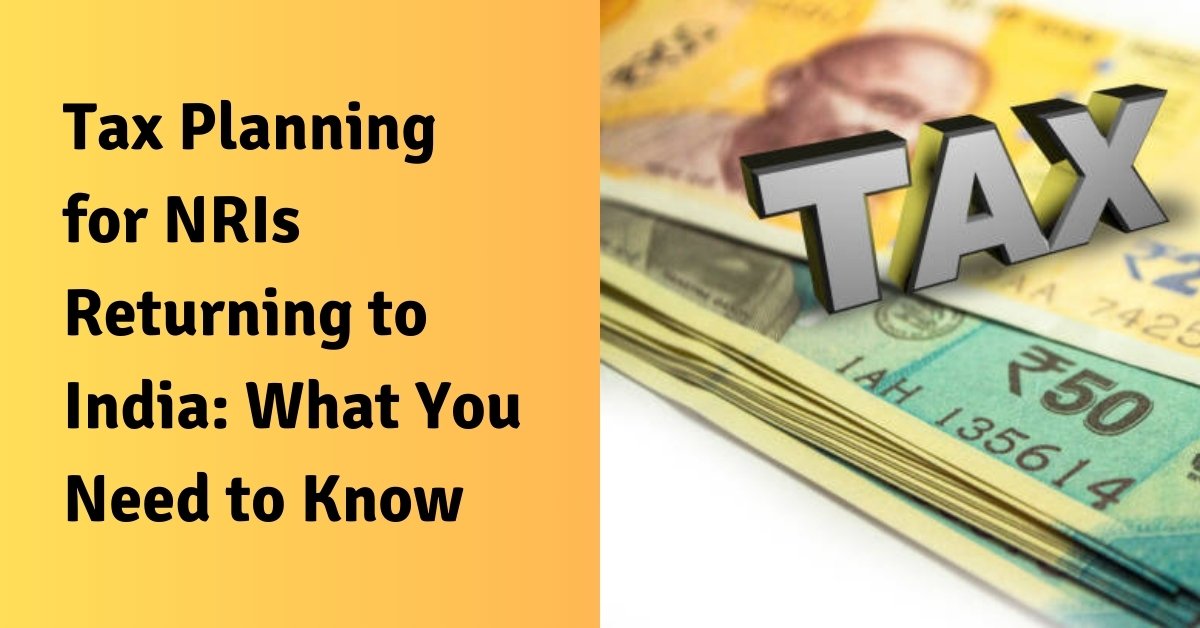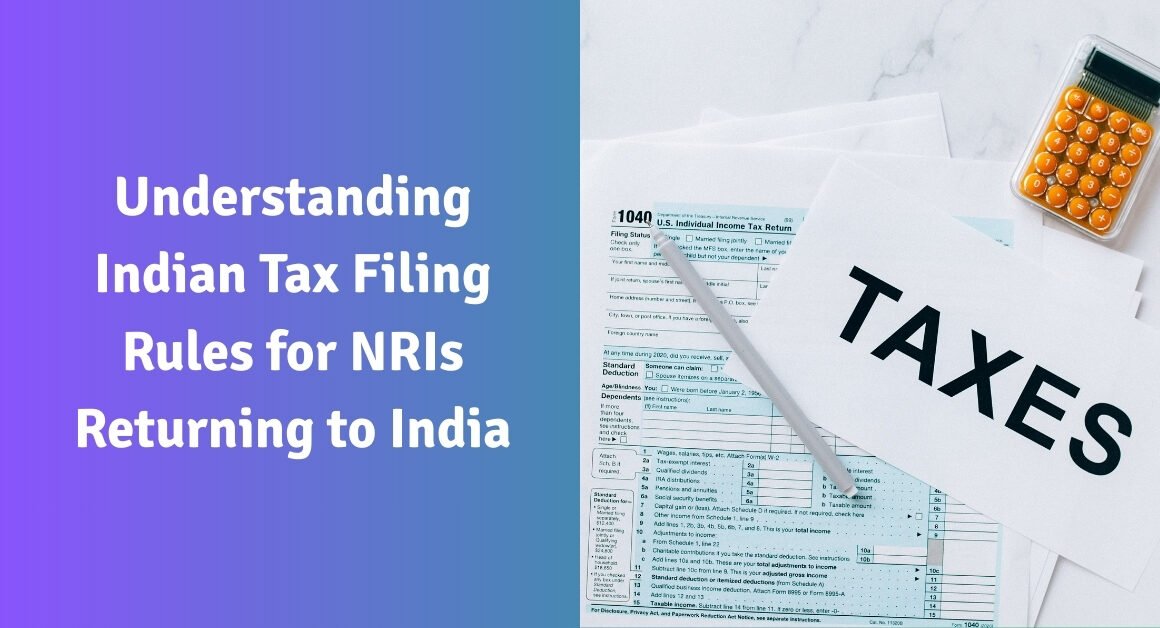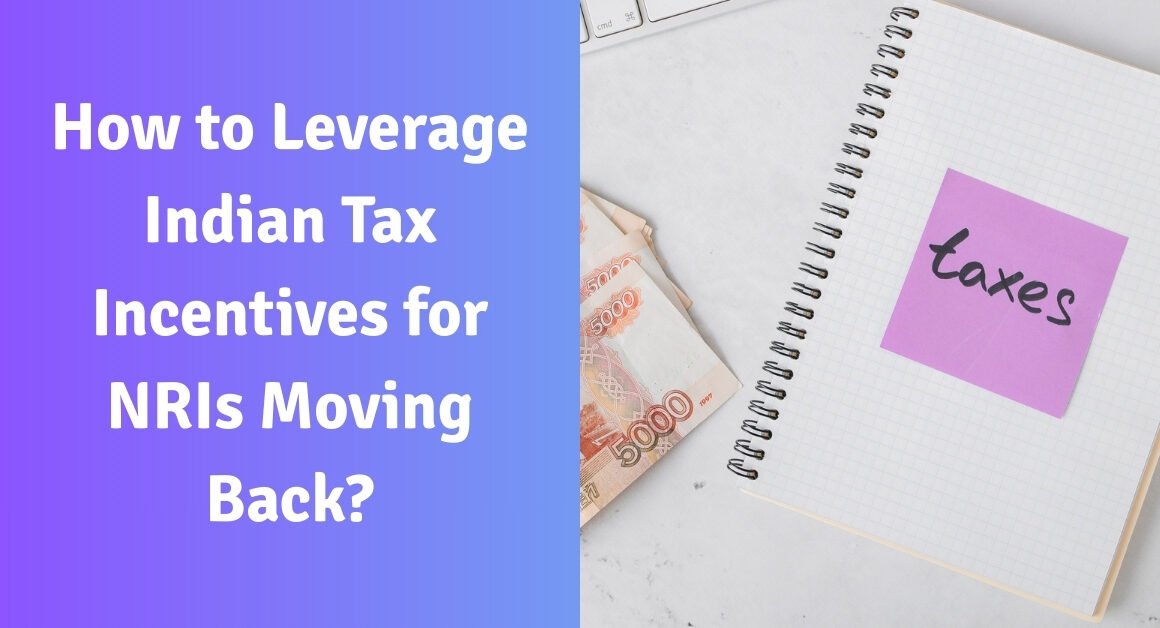As a Non-Resident Indian (NRI) planning to return to India, it is crucial to understand the tax implications and strategies to ensure a smooth transition. Proper tax planning can help you optimize your finances and avoid any unnecessary tax liabilities. In this blog post, we will delve into the essential aspects of tax planning for NRIs returning to India.
Residential Status:
Your residential status plays a significant role in determining your tax obligations in India. As per the Indian Income Tax Act, if you stay in India for 182 days or more in a financial year or 60 days or more in a financial year and 365 days or more in the preceding four financial years, you will be considered a resident for tax purposes. It is essential to plan your return date accordingly to avoid any unintended tax consequences.
Taxation of Income:
Once you become a resident, your global income will be subject to taxation in India. This includes income from salary, business profits, capital gains, and other sources. However, if you have paid taxes on your foreign income in the country of origin, you may be eligible for a foreign tax credit in India to avoid double taxation. It is advisable to consult with a tax expert to understand the specific tax implications based on your income sources and the Double Taxation Avoidance Agreement (DTAA) between India and the country where you earned the income.
Asset Declaration:
As an NRI returning to India, you are required to declare your foreign assets and income in your Indian tax return. This includes bank accounts, investments, immovable properties, and any other assets held outside India. Failure to disclose such assets can lead to penalties and legal consequences. It is crucial to maintain proper documentation and seek professional guidance to ensure compliance with the asset declaration requirements.
NRE and NRO Accounts:
If you have Non-Resident External (NRE) and Non-Resident Ordinary (NRO) accounts, it is important to understand the tax treatment of these accounts upon your return. The balances in your NRE account can be repatriated tax-free, while the interest earned on NRO accounts is taxable. You may need to convert your NRE account to a resident account and your NRO account to a resident savings account within a specified timeframe after becoming a resident.
Capital Gains:
If you have investments in India or abroad, it is essential to consider the capital gains tax implications. Long-term capital gains from the sale of equity shares and equity-oriented mutual funds are taxed at a concessional rate of 10% (without indexation) if the gains exceed Rs. 1 lakh. Short-term capital gains from such investments are taxed at a rate of 15%. For other assets, such as immovable property or debt mutual funds, the tax rates vary based on the holding period and the nature of the asset. Proper planning and timing of investment decisions can help optimize your tax liability.
Retirement Planning:
Suppose you have accumulated funds in foreign retirement accounts, such as a 401(k) or an Individual Retirement Account (IRA). In that case, you need to consider the tax implications of bringing those funds to India. The taxation of such funds depends on the DTAA between India and the country where the retirement account is held. It is advisable to seek professional guidance to explore options such as maintaining the foreign retirement account or transferring the funds to a recognized Indian retirement scheme.
Tax Deductions and Exemptions:
As a resident, you become eligible for various tax deductions and exemptions available under the Indian Income Tax Act. These include deductions for investments in tax-saving instruments like Public Provident Fund (PPF), National Pension System (NPS), and life insurance premiums. Familiarizing yourself with these deductions and planning your investments accordingly can help reduce your tax liability.
Advance Tax Payments:
If your estimated tax liability exceeds Rs. 10,000 in a financial year, you are required to pay advance tax in installments. Failure to pay advance tax or paying an insufficient amount can result in interest charges. It is crucial to estimate your tax liability accurately and plan your advance tax payments to avoid any penalties.
Professional Assistance:
Given the complexity of tax laws and the unique circumstances of NRIs returning to India, it is highly recommended to seek the assistance of a qualified tax professional. They can help you navigate the tax landscape, optimize your tax planning strategies, and ensure compliance with the latest tax regulations.
In conclusion, tax planning for NRIs returning to India involves various considerations, including residential status, taxation of income, asset declaration, investment planning, and retirement planning. By proactively addressing these aspects and seeking professional guidance from NRI Tax consultants, you can minimize your tax liabilities and ensure a smooth financial transition as you return to India.
Disclaimer: The information provided here is for educational and informational purposes only and should not be construed as financial, legal, or tax advice. Consult with a qualified professional before making any investment decisions. We do not accept any liability for errors or omissions in this information nor any direct, indirect, or consequential losses arising from its use.
FAQs
1. How is my residential status determined for tax purposes when I return to India?
Ans – Your residential status is determined based on the number of days you stay in India during a financial year. If you stay in India for 182 days or more in a financial year or 60 days or more in a financial year and 365 days or more in the preceding four financial years, you will be considered a resident for tax purposes.
2. Will my global income be taxed in India once I become a resident?
Ans – Yes, once you become a resident, your global income, including income from salary, business profits, capital gains, and other sources, will be subject to taxation in India. However, you may be eligible for foreign tax credits if you have paid taxes on your foreign income in the country of origin.
3. Do I need to declare my foreign assets and income when I return to India?
Ans – Yes, as an NRI returning to India, you are required to declare your foreign assets and income, including bank accounts, investments, immovable properties, and any other assets held outside India, in your Indian tax return.
4. What happens to my NRE and NRO accounts when I return to India?
Ans – Upon your return, you may need to convert your NRE account to a resident account and your NRO account to a resident savings account within a specified timeframe. The balances in your NRE account can be repatriated tax-free, while the interest earned on NRO accounts is taxable.
5. How are capital gains taxed when I return to India?
Ans – The taxation of capital gains depends on the nature of the asset and the holding period. Long-term capital gains from the sale of equity shares and equity-oriented mutual funds are taxed at a concessional rate of 10% (without indexation) if the gains exceed Rs. 1 lakh. Short-term capital gains from such investments are taxed at a rate of 15%. For other assets, the tax rates vary based on the holding period and the nature of the asset.
6. Can I continue to hold my foreign retirement accounts after returning to India?
Ans – The taxation of foreign retirement accounts, such as a 401(k) or an IRA, depends on the Double Taxation Avoidance Agreement (DTAA) between India and the country where the account is held. It is advisable to seek professional guidance to explore options such as maintaining the foreign retirement account or transferring the funds to a recognized Indian retirement scheme.
7. What tax deductions and exemptions are available to me as a resident?
Ans – As a resident, you become eligible for various tax deductions and exemptions under the Indian Income Tax Act. These include deductions for investments in tax-saving instruments like Public Provident Fund (PPF), National Pension System (NPS), and life insurance premiums.
8. Do I need to pay advance tax when I return to India?
Ans – If your estimated tax liability exceeds Rs. 10,000 in a financial year, you are required to pay advance tax in installments. Failure to pay advance tax or paying an insufficient amount can result in interest charges.
9. How can I optimize my tax planning as an NRI returning to India?
Ans – To optimize your tax planning, you should consider factors such as the timing of your return, declaration of foreign assets and income, investment planning, retirement planning, and utilization of available tax deductions and exemptions. Seeking professional guidance from a qualified tax expert can help you make informed decisions.
10. Is it necessary to seek professional assistance for tax planning when returning to India?
Ans – Given the complexity of tax laws and the unique circumstances of NRIs returning to India, it is highly recommended to seek the assistance of a qualified tax professional. They can help you navigate the tax landscape, optimize your tax planning strategies, and ensure compliance with the latest tax regulations.





